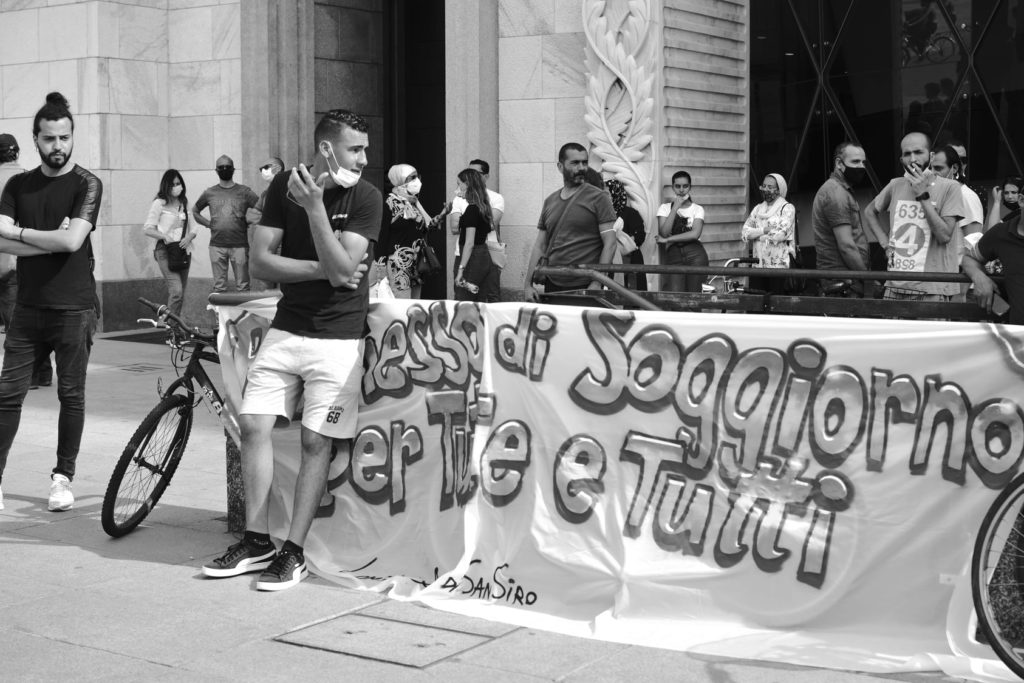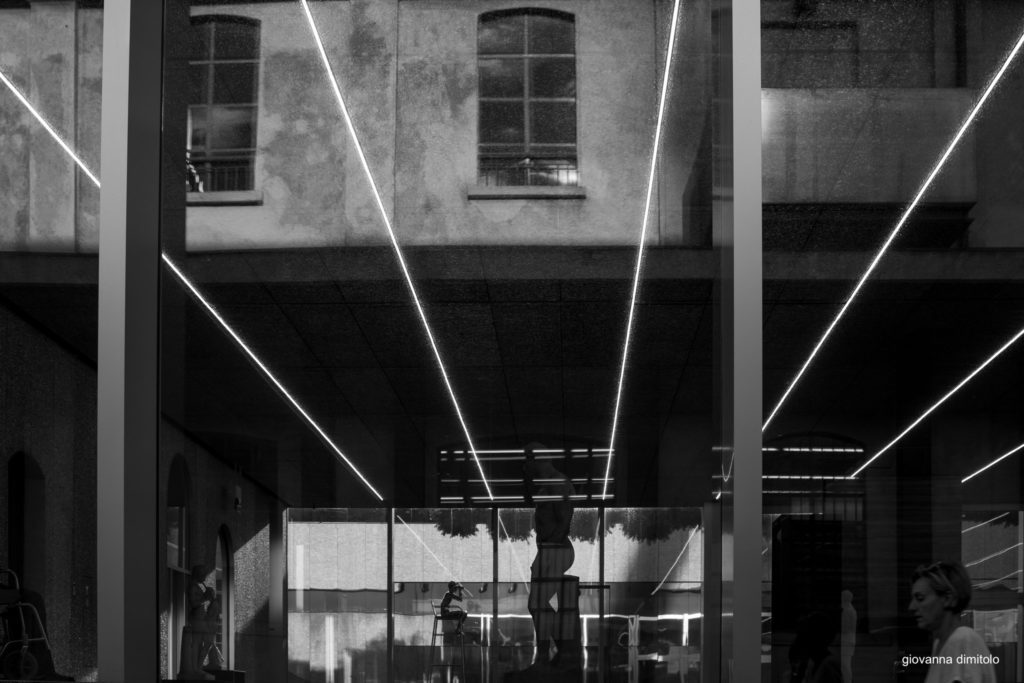by Francesco Ferri; Translation: Border Disorder; Foto: Giovanna Dimitolo
The reading of the election results with an eye towards migration policy, was followed, widely and repeatedly, by two reactions. The first is despondency. It is very easy to see that the image of a parliament with a sizable right majority would scare those who are migrating, those who have a migratory background and those mobilising for the recognition of their rights. It is an understandable and well founded fear: the stated policies of the right, their language and their political positions are indeed frightening.
Secondly, in the discussion about which political options should be prioritised as a movement, in this new context, it is very likely that these subjective feelings of fear will be accompanied by defensiveness. Similarly from this perspective, it is reasonable to see why. What is to be expected is a step up in the quality of the questioning of migrant rights. Therefore, one naturally asks the best way to defend oneself.
Fear is a noble sentiment – even more so when it is shared and is an aftermath of politics – and a tendency toward defensiveness is often necessary. That being said, they are both dangerous options in their own ways. Fear, when it is not contaminated by other feelings, can be paralysing. A defensive position alone – developed in a period in which blind defence of the status quo is everywhere and not enough – can be useless.
Is the electoral accomplishment of the right in Italy compatible with sensations other than fear? In the new political landscape, is it possible to imagine new political initiatives that could achieve new rights? Overlaying the electoral results onto the context of the last decade of migration policy, it is perhaps just possible to identify some elements that complicate this bleak picture and also just possible to see some potential opportunities.

A radical change of phase?
The electoral results seem to signal a clear change in direction. In part, it is real: with the success of the right, there is now a solid parliamentary majority that is hostile to migrants and to the rights of migrants. Although, when observing the migration policy developed over the last decade – characterised largely by governments of national unity – it is difficult to mourn this long political period. The initiatives introduced by Minister Minniti are exemplary of the policies developed over the course of these last ten years. Such measures are the product of the securitisation which has taken root in the territory of the centre left, and which later opened the doors for the political actions of Minister Salvini within the government of Conte I. Subsequently, the Ministry managed by Lamorgese has adopted an attitude slightly different, principally in their rhetoric however, which means nothing has been followed through structurally.
Fear of attacks from the right government could maybe be mitigated by the awareness that, in previous years, the attitude of the legislator to border mobility has always been hostile.
It is possible that, in the first months of power, the government will put out a new decree to revise the partial updates introduced to soften the security laws of 2018 and 2019 when they were revised. At the same time, that is not to rule out the possibility that the attacks from the government will develop more long term and with increased hybridity. In some political periods the disciplining of migration is exhibited, celebrated and exacerbated by verbal violence. At other times, the same objectives are pursued but with a different visibility, with a more careful use of words, with less exposure.
In the new political scene it is possible to expect both tones. It will depend on many factors, not just those connected to migration policy, but also the development of international crises and inflation, the stability of the government, the condition of the economy, among others. In any case, it is very probable that the focal points – delocalisation of the borders, criminalisation of solidarity, precarity of immigration statuses – are decided along the same lines as the preceding government. In this light, the new political phase appears, in part, a continuation of the previous. That is not in itself a consolatory element, but with this awareness, the mass of postelectoral fear can be less paralysing: we are going towards something, at least partially, already known.

Institutions and society
The picture of the parliament is inescapable: the right – discursively more hostile towards migrants – is hyper-represented. Does this institutional expansion correspond to a growth in the consensus for these political forces? With results in hand, it is difficult to support this conclusion. In absolute terms, the votes achieved by the right are effectively equivalent to those in 2018: about 12 million. Even in terms of the percentage of the vote, the right did not exactly break through: the very wide majority in parliament – up to 60% of the Chamber – is given by the multiplier effect of the current electoral system. In addition, voter abstention is at its highest in history and, in some areas of southern Italy, has reached 50%.
The elections represent only partially the tendencies across society. The preferences expressed in the voting booth frequently reflect a logic beyond mere adherence to electoral programmes. But also, even including the possibility that those who decided to vote for the right subscribe in full to the proposals formulated by Fratelli d’Italia and their partners in terms of migration policy, the picture is probably less bleak than the hyper-representation of this political force in parliament would suggest. The right, in essence, won but did not break through. This is an important factor and something to bear in mind, that when elections are gone and in the past, the facts of voter abstention and the multiplier effect of the current electoral system will no doubt be forgotten. Above all, with these lenses, the image of an Italy that is uniquely racist is challenged. Certainly, top-down institutional and systemic racism, as well as racism from below, are foundationally two key factors of our country. At the same time, even assuming for argument’s sake that the electoral results are a mirror of society, the diverse block of not voting for the right – made up of those who, voluntarily or not, did not vote, or those who voted for less (at least rhetorically) hostile parties – is sizable. They are, by far, the large majority of the country.
It is a large and heterogeneous block, driven by diverse motivations. It is, in any case, a testimony to the fact that electoral adhesion to explicitly racist positions is not the most widespread option. This ensemble of not voting for the right is not in itself an antiracist force, but it is useful – maybe indispensable – to question the most effective ways to mobilise some of the social groups that make up this diverse block in light of this new political scenario.

Repoliticisation
With cautiousness, and the previously described complexities, it is probable that the new political landscape will be characterised by a repoliticisation of migration policy. Afterall, it is unlikely that the theme of governing migration flows will remain at the margins of the debate like how things were during the Draghi period.
Repoliticisation could happen in the short term, if the circumstances permit, or it could be in the middle term. In any case, it is a challenge that needs to be negotiated with conviction and determination. From the point of view of those who organise with migrants, it is a decisive game. Unlike in the last period of the previous parliamentary term, it is probable that we will find ourselves playing on an open field: the political actions will be clearer and widely readable.
It is one element, among many, that could be decisive in this new scene. Whoever presents the themes – anticipating the opponent – with the most force and coherence, and is capable of determining what is discussed, will undoubtedly have a strategic advantage. From this perspective, it is useful to imagine the metaphor of not playing on the back foot and simply waiting for errors from the opponent. So, just being reactive to the inevitable actions of the government – and not taking the initiative autonomously – is not enough. On the other hand, in these first few weeks of legislature, a collective effort to act, in a way that is radical, forceful and intelligent, without waiting for actions to react to, could be developed. For example, rather than imagining defending the collection of rights already available, it is useful to make the first move and underline the need to introduce accessible and wide regularisation policies. Or even, while waiting to see how the policies of delocalisation of the border will develop in this new cycle, it is essential to question the existing arrangements: the policies of cooperation with countries of origin, departure and transit, the management of internal and external borders, and the strategic function of so-called hotspots (strategic detention centres).
Being afraid is both natural and healthy. With fear – individual and collective – you can have a dialogue. Low-grade political initiatives, hyper-defensive positions, timid humanitarian responses can all contribute to the spread and permanence of fear. On the contrary, a wider spectrum of imagination – that anticipates and reorients the likely repoliticisation of the public debate about migration – can enable the construction of mobilisations that rise to the challenges of the present.




